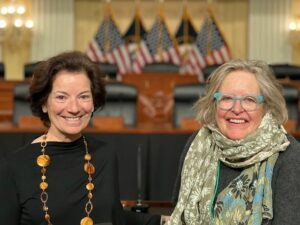Lynn D. and I have returned from The Garden Club of America National Affairs & Legislation Conference in Washington DC. The truth is, I have been avoiding this event for years because the thought of visiting politicians and trying to advocate in a “bipartisan” way for GCA legislative priorities left me feeling slightly nauseous. I really only agreed to go if Lynn would go with me. She’d been two times already, she is a former litigator, and I knew I wouldn’t have to say much… Well, my head is still spinning, but I am going to try and distill my impressions from two days of drinking water from a fire hose on climate change and other (somewhat less dire, but not really) issues. The speakers at this conference were from both political parties and were, by and large, really good. And talking to political aides, who are all pretty much freshly emerged from childhood, isn’t as hard as I thought it was. I’ll go back, if I’m asked. After all, as one speaker said, we are gardeners. We pay attention to what is happening in our own backyards. We need to be talking to everybody about this.
I am never going to be a bipartisan kind of gal, and the information we were getting at the conference often scared me about the future we are leaving to our children and grandchildren. But I did start to understand that how you approach an issue in a world that is this divisive is important. More than one speaker stressed that polls show 60% of Republicans in our country agree that our warming world is a major concern. That’s a majority, and something that gives me hope. The head of the Nature Conservancy explained it very simply – give people the scientific facts (head); explain why this is important to their lives and the lives of their families and communities (heart); then listen in a thoughtful way to their responses. Have a dialogue. Show them examples of people like them who have made the changes with positive results. Only then will they be ready to receive information they can use, to make changes that make sense to them in their lives (hands). Sigh. Doesn’t feel like we’ve got the time for that, but I’ll try.
I was also very struck by a speaker, Spencer Glendon (probablefutures.org). He explained that climate change is not just a natural problem, it is a civics problem. Human civilization began long ago when the climate stabilized. Agriculture became possible, because people could predict the weather. Societies and cultures were able to form, because people felt safe that they could stay in one place. They could build cities, create capitalist mercantile economies, even build stock markets in which regular people could invest in those economies. Democratic institutions became workable and successful. They could even invent things like insurance to protect themselves from the occasional natural catastrophe. But once the certainty that those catastrophes are not just going to be occasional is gone, all those systems are at risk. You can all ask yourselves if anything sounds familiar about this scenario (see Florida and California homeowner’s insurance problems), but I’m going to go off and work on my thoughtful listening and hopefulness skills.
-Story by Mary F.

